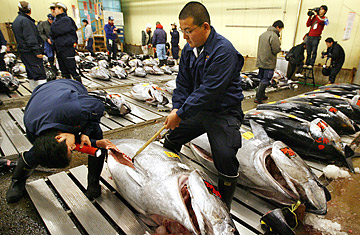
Fishmongers check the quality of meat on large tuna at Tokyo's Tsukiji fish market
The Atlantic bluefin tuna is considered a delicacy from Osaka to Omaha; at Tokyo's venerable Tsukiji fish market, a single giant blue tuna can fetch up to $100,000 in auction. But the sheer popularity of the fish among consumers of sushi and sashimi has caused populations of the bluefin tuna to plummet, with its total numbers down more than 80% since 1970. We are literally eating the bluefin tuna to death.
But there may still be hope for the species. On Wednesday the Obama Administration announced that it would support a proposed ban on international trade of the Atlantic bluefin tuna at the upcoming meeting of the Convention on International Trade in Endangered Species (CITES) in Doha, Qatar. The decision, for which conservationists had long been lobbying, could pave the way toward the most wide-ranging protections ever put in place for a major commercial marine species. "This announcement could be a real turning point in the fight to protect the tuna," says Susan Lieberman, director of international policy at the Pew Environment Group and a veteran of the CITES process. "This will help ensure the future of this endangered fish."
Protection for tuna was initially proposed by Monaco late last year, and if the motion passes at the CITES meeting, the fish would be listed under the treaty's Appendix I. That would amount to a total trade ban, though countries would still be able to fish the tuna for their own markets. But given that about 80% of the worldwide bluefin tuna catch is eventually eaten in Japan — with the main fishing nations being Italy, France and Spain — a global trade ban should significantly reduce pressure on the fish population, which is now at less than 15% of its estimated historical high. "This step will help fix a management system that is broken," says Mark Stevens, senior program officer for fisheries at the World Wildlife Fund. "First of all, we have to stop the overfishing pressure."
The U.S. decision to support the ban should go a long way at the CITES meeting, but it doesn't ensure that the tuna will be protected under Appendix I. Any decision at CITES requires the vote of at least two-thirds of the represented countries, and while the European Union has voiced its support for the bluefin tuna, Japan remains very much against a trade ban. In the past — especially during the ongoing debate over commercial whaling — Tokyo hasn't been shy about using its generous foreign aid budget to leverage support from smaller countries.
Even if the ban goes into effect, Japan or any other country has the option of taking a "reservation" that would allow it to effectively continue trading the tuna — but they would still need a fishing country from which to buy. "The U.S. won't do that," says Lieberman. "The E.U. won't do that. And we believe they'll exert sufficient pressure on the North African nations to ensure that they won't either."
The White House's decision wasn't an easy one, politically. The tuna ban is strongly opposed by many U.S. commercial fishermen, who worry that a prohibition of global trade in one of the most valuable species in the ocean would inevitably damage the industry. Republican Senator Olympia Snowe of Maine blasted the announcement, calling it a "reckless decision that will ultimately prove ineffectual and cause disproportionate harm to the U.S. bluefin tuna industry." And many fishermen doubt that the tuna is really threatened with extinction.
Yet a number of international scientific agencies have found evidence that the tuna is truly endangered, most recently the U.N. Food and Agriculture Organization, which announced support for trade limitations in December. If the tuna is finally listed, it would represent a watershed moment in endangered-species protection. It's one thing to halt the hunting of relatively rare species like the rhino or the elephant. It's another to ban the trade of a major staple of sushi restaurants — especially as a cuisine that was once limited to Japanese workers has become a global favorite. A ban on the bluefin tuna trade would likely raise consumer prices of the fish in the short term, but it may be the only thing that could prevent the tuna population from collapsing altogether. It would also represent a rare occasion when the international community proved willing to sacrifice today to protect the future. "Nothing in the fishing world like this has ever happened before," says Stevens. "It's a huge step forward."
